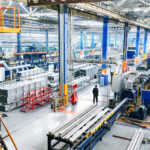The Institute for Supply Management released its monthly manufacturing Purchasing Managers Index (PMI) on Aug. 1 reflecting July activity, which showed a fourth straight monthly decline.
The PMI — regarded as a reliable indicator of overall U.S. industrial economic health — fell 1.7 percentage points from June to a mark of 46.8% and indicated that demand remains subdued in the manufacturing sector — which encompasses 10.3% of the U.S. economy — and at a further decelerated pace than earlier this past Spring.
Economists polled by Reuters had forecast a PMI increase to 48.8%.
The July PMI reading indicated contraction (anything below 50.0%) for the 20th time in the past 21 months.

Of the July PMI’s 10 factoring indexes, five moved lower during July, and eight ended the month in contraction territory. The overall figure was driven down by declines of 1.9 points in new orders, 2.6 points in production and 5.9 points in employment.

“Demand remains subdued, as companies show an unwillingness to invest in capital and inventory due to current federal monetary policy and other conditions,” ISM Manufacturing Business Survey Committee Chairman Timothy Fiore commented on the July report. “Production execution was down compared to June, likely adding to revenue declines, putting additional pressure on profitability. Suppliers continue to have capacity, with lead times improving and shortages not as severe.”
Fiore added that 86% of manufacturing GDP contracted in July, up from 62% in June and 55% in May. More concerning, he said, is that the share of sector GDP registering a composite PMI calculation at or below 45% — considered a good barometer of overall manufacturing weakness — was 53% in July, a 39-point jump from June.
All six of the largest manufacturing industries the PMI tracks — Machinery; Transportation Equipment; Fabricated Metal Products; Food, Beverage & Tobacco Products; Chemical Products; and Computer & Electronic Products — contracted in July.
The five manufacturing industries reporting growth in July were: Printing & Related Support Activities; Petroleum & Coal Products; Miscellaneous Manufacturing; Furniture & Related Products; and Nonmetallic Mineral Products.
The 11 industries reporting contraction in July were, in order: Primary Metals; Plastics & Rubber Products; Machinery; Electrical Equipment, Appliances & Components; Transportation Equipment; Fabricated Metal Products; Food, Beverage & Tobacco Products; Wood Products; Paper Products; Chemical Products; and Computer & Electronic Products.
ISM PMI Respondent Commentary
- Here is a sampling of PMI survey respondent commentary that ISM provided for July:
- “Business is relatively flat — the same volume, but smaller orders.” [Chemical Products]
- “Demand continued to soften into the second half of the year. Supply chain pipelines and inventories remain full, reducing the need for overtime. Geopolitical issues between China and Taiwan as well as the election in November remain weighing concerns.” [Transportation Equipment]
- “Even though we are used to a seasonal reduction in business over the summer, consumer behavior is changing more than normal. Sales are lighter, and customer orders are coming in under forecasts. It seems consumers are starting to pull back on spending.” [Food, Beverage & Tobacco Products]
- “Availability of parts is good, with small exceptions of missing materials here and there. Ordering is still well below typical levels as we continue to burn down inventory of raw goods, with ‘normal’ ordering trends expected to return sometime in the second half of 2024.” [Computer & Electronic Products]
- “It seems that the economy is slowing down significantly. The number of sales calls received from new suppliers is increasing significantly. Our own order backlog is also diminishing. We are hoping for an increase in customer demand, or we will possibly need to make organizational changes.” [Machinery]
- “Unfortunately, our business is experiencing the sharpest decline in order levels in a year. We were well below our budget target in June; as a result, it was the first month this year that we had negative net income.” [Fabricated Metal Products]
- “Business is slowing, and we are taking cost actions.” [Electrical Equipment, Appliances & Components]
- “Some markets that are usually unwavering are showing weakness. Weather is the common factor, but only so much.” [Nonmetallic Mineral Products]
- “Our sales forecast for July and August are slow, but we’re making every attempt to remedy that situation. Our medical end-user customers continue to meet their forecasts, which is promising.” [Textile Mills]
- “Elevated financing costs have dampened demand for residential investment. This has reduced our need for component products and inventory.” [Wood Products]
Related Posts
-
Missing economists' expectations of an increase, the latest PMI reading indicated contraction for the 19th…
-
It followed a sizeable jump in January, reflecting broad weakened industrial demand.
-
The industrial economy barometer has been in contraction territory for 18 of the past 19…






